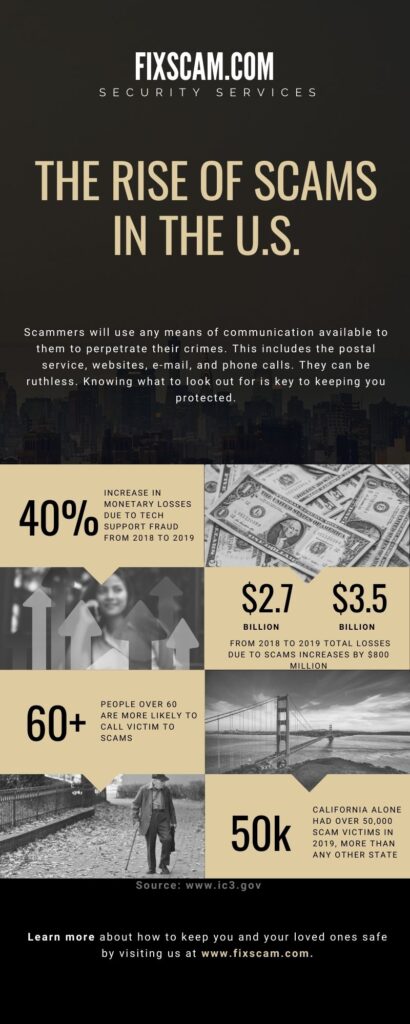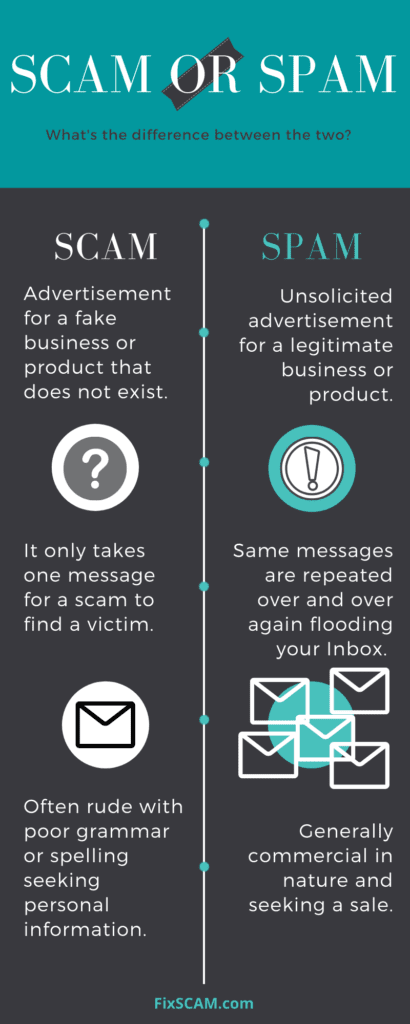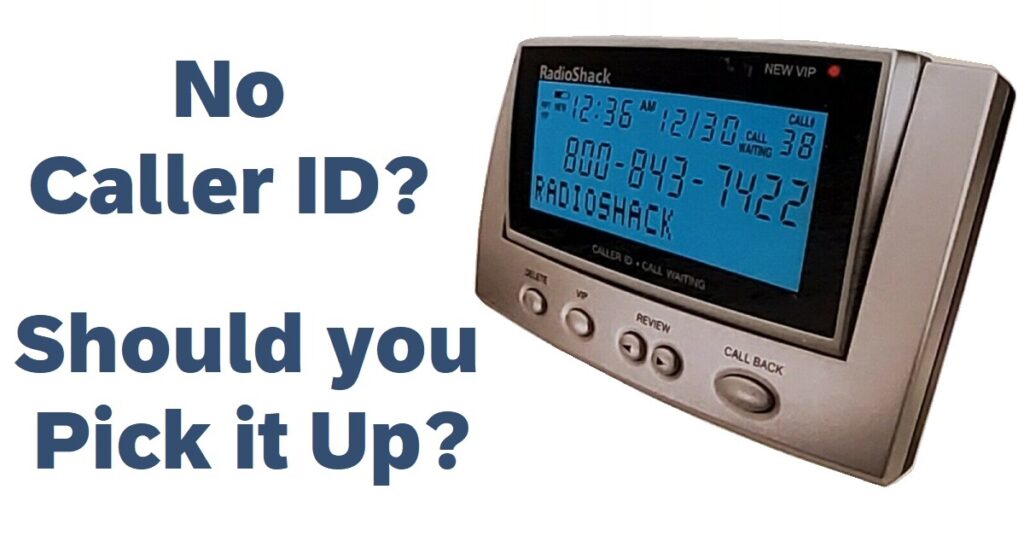It seems these days phone calls with No Caller ID are a constant annoyance. When your phone rings and the caller ID does not display a name, you may be wondering if it is safe to answer. Some people get dozens of unwanted calls every day and they can become hard to ignore. This article will explain if these calls are dangerous. I will also show you why you receive these calls, what can happen if you answer, and what you can do about spam phone calls.
You should not pick up calls with No Caller ID. Answering blocked or private calls can be dangerous if you don’t know what to look out for. Many unwanted phone calls are unsolicited spam from companies trying to sell you something. But some of these unknown calls are scams trying to steal your money.
Use RoboKiller to start blocking spam calls.
Start blocking wanted calls with RoboKiller.
Table of Contents
Why do I get No Caller ID calls?
A Quick History Lesson
There’s a certain mystery behind blocked numbers that fascinates people. A lot has changed since the late 1980s when caller ID services first became available. Back then, most phones were landline and the numbers were listed. All of these numbers were cataloged in a printed book called the Yellow Pages. My, how things have changed – I haven’t seen a physical phone book in ten years.
But the comfort of knowing who was on the other end of the phone was not meant to last. A major technological advancement called the cellular phone first budded in the mid-1970s. By the mid-80s, they had become widespread. As of 2019, about 80 percent of adults only have a cellular phone, according to AARP.com.
Callers Become More Private
This is not the only advancement that made screening phone calls more difficult. Through the years, privacy laws have become stricter. This has made it easier for people to conceal their contact information and the means to reach them. There is even a National Do Not Call Registry aimed at blocking incoming calls.
All of this contributes to an increase in the amount of No Caller ID calls. Caller ID services are often limited to public sources of information. When a phone number calls you, if it is not in your contact list and is not publicly shared, the number may not appear. Also, the caller may be using a service to intentionally block or make their number private.
Is it Safe to Answer No Caller ID Calls?


Start blocking wanted calls with RoboKiller.
The above infographic is about the rise in phone scams. These calls increase every year. I’m often asked is No Caller ID dangerous. Are they all scams, no. But they do come with a risk. Many calls are scams. Others are simply annoying spam calls from telemarketers.
Calls with No Caller ID cannot hack your phone. If the call is a scam, they may try to trick you into revealing personal information or ask you to send them money. They cannot get access to your phone and cannot trace your location.
Be warned that by answering an unknown phone call, you could be telling a spammer that your number is valid. If this is the case, you can now expect even more spam phone calls. If you receive a call you don’t recognize, I don’t recommend calling them back. Sometimes long-distance charges will apply.
Answering a call with No Caller ID will not instantly harm you. The risk occurs when you answer without being well informed about how to spot and avoid scams. Luckily a majority of this website is dedicated to training and education to help you in this matter. The more you read, the better protected you will be.
Is No Caller ID Spam?
Not all calls from a blocked number or that have No Caller ID are spam. Spam is unsolicited contact usually with the aim of promoting a business or product. Oftentimes these are repeated and unwanted calls or messages. People always wonder – why do they keep calling? Spammers get their motivation from the opportunity of making money. The small effort of making numerous phone calls – even to the same person – is well worth the payoff.
Here’s why they may not be spam calls. There are other reasons that I will explain below as to why someone may call you from a blocked number. Also, it can be hard to tell how many calls with No Caller ID are from the same caller. This means you do not know for sure they are repeat callers. And since you are reading this article, you may not have answered these calls to know if they are in fact advertisements after all.
Use RoboKiller to start blocking spam calls.
Difference Between Scam & Spam
A scam is a crime where deceit is used to trick a victim into providing personal information or money. Criminals then use the personal information for financial gain. Often the criminal pretends to be a real company or government agency. They make a false claim, threaten the victim, or provide fraudulent services.
While not all spam is a scam, scammers often use spam as their way of communicating with potential victims. Spam differs from these scams because spam can often be a legitimate company. Think of spam as describing the method of communication. It is unwanted, commercial in nature, and often repetitive.





Examples of Spamming
Because I own this website, I often receive hundreds of emails from fake companies claiming my website domain name is going to expire. The only problem is they are not my hosting provider. If I were to click any links in the message, it would direct me to their website where they would ask for personal information. They might ask for me to make a payment to renew the website and then steal my financial information. Just as bad, they could ask for my website login credentials to steal control.
Another example is the emails from someone claiming to be from e-Harmony. One problem is I have never used their service. Another problem is their return email address appears to be a random combination of letters and numbers and not official looking. They could be trying to earn a commission by having me click on an affiliate link to sign up for the program. Worse, they could collect my personal information when I fill out my profile on their fake website.
You may have your own example of spam without even knowing it. Log into your email and check your Junk Mail folder. These are email-based examples, but phone spam follows the same formula.
Scam Examples
I have been studying and fighting scams for years. The one constant thing I’ve found is scams are constantly evolving. With that in mind, here are just three of the hundreds of possible scams.
First is what is referred to as the grandparent scam. This is when a caller targets an older victim while impersonating their children or grandchildren. The victim must be first convinced they are speaking to a loved one. Then the scammer invents a distressing story such as being under arrest or in the hospital. The scam is successful when the victim sends the scammer money to assist.
Scare tactics cover a number of different types of scams. Sometimes the caller claims to be law enforcement or the IRS. They convince the victim there is an outstanding warrant or overdue taxes. The victim sends the scammer money to avoid being arrested for the fake warrant or non-existent tax debt.
Finally, there are 876 Area Phone Scams where the caller claims the victim won a prize. In order to claim the millions of dollars promised, the victim is told to pay taxes or a fee. When faced with the possibility of making a lot of money for little cost, the victim is convinced. In the end, there is no prize and the caller is never heard from again. I wrote a Complete Guide to 876 Area Code Scams you can read on this website.
Who Calls from Blocked Numbers?
Other than the scammers and spammers mentioned above, there are legitimate reasons people use a blocked phone number. When someone calls you with No Caller ID displayed, they may be using the star sixty-seven (*67) feature. When they do this, instead of their name or number, you will see “Blocked” or “Private”. You may be wondering if the call with No Caller ID is someone in your contacts. The answer is you won’t know, that’s the whole point.
The reasons people use this feature vary. One group of people who uses it is the police. Most police officers are not issued official cell phones. If they have to call you away from their station, they would have to use their personal cell phone. No matter what kind of job you have, there are some people you do not want to have your personal cell phone number.
Another reason people block their numbers is that they are returning a call or voicemail to a number they don’t recognize. I recently answered a call where the person on the other end asked who they were calling. I told them they were the ones calling so they should already know. When they persisted, I hung up. The goal is not to reveal any personal information you don’t have to.
Finally, you may want to block your number if you’re calling a business and want to make sure your number doesn’t end up on their call list. Since you initiated the contact, they may be able to call you back regardless of your phone being on a do not call list.
Can No Caller ID be traced?



You may be wondering how to find out who called you from a blocked number. Calls with No Caller ID do not show on your phone bill. To unmask No Caller ID, you are going to need to enlist the help of the police. The only problem is you cannot do this on a whim. They are only going to investigate if the calls you receive can be classified as a crime. This includes harassment, stalking, and after you are scammed out of money. Through their investigation, they will work their magic to find out who called you.
Don’t be too surprised if this process takes an extended amount of time. The police will need to get a warrant with the approval of a judge. After that, the phone service provider can take weeks to respond. Finally, even if you go find out who is on the other line, in most cases you won’t recognize them. If it is a spammer or scammer, the number may trace to somewhere overseas.
Be wary of websites making claims they can identify any private number. Their claims are too good to be true. Often, they are in fact scammers who will take your money in exchange for little or inaccurate information. Knowing who is calling you is not worth the risk. Callers with No Caller ID have the ability to leave you a voicemail. If they do, their message can be an important clue as to their identity.
How to Get No Caller ID to Stop Calling
Start blocking wanted calls with RoboKiller.
Sometimes callers with No Caller ID can be relentless. Many people report receiving dozens of calls every day. It can be hard to ignore your phone ringing constantly. This is especially hard when you are waiting for an important call. When unwanted calls interrupt you during dinner or in the middle of the night, you need to know how to block spam calls.
The very best way to do this is to work with your phone service provider. Call their customer service number. I’ve listed the customer service number for some of the most popular phone service providers. If your company is not on the list, a quick Google search should help.
| Service Provider | Customer Service Number |
| Verizon Wireless | 1 (800) 922-0204 |
| T-Mobile / Sprint / MetroPCS | 1 (800) 937-8997 |
| AT&T | 1 (800) 288-2020 |
| Consumer Cellular | 1 (888) 345-5509 |
| Boost Mobile | 1 (866) 402-7366 |
| Xfinity Mobile | 1 (888) 936-4968 |
| Cricket Wireless | 1 (800) 274-2538 |
Another option I suggest is screening your calls using your voicemail. This is what I do. Manually blocking every number each time they call is useless since they change the number they are calling from frequently. For me, it’s important not to pick up calls with No Caller ID. If the caller is a spammer, now they know my number is valid. Knowing they can reach a real person with my number will surely mean they will continue to call.
Finally, look into a caller ID app you can download onto your phone. They are not perfect and will not stop all unwanted calls. But they do limit the number of unknown calls you receive and can completely stop blocked and private numbers. Sometimes they help identify numbers you don’t recognize so you will know if you want to answer or not.
Best No Caller ID App
- Robokiller (Answer Bot feature)
- Hiya (Rated 4.45 out of 5)
- Call hound
- Other – Phone Service Provider
Start blocking wanted calls with RoboKiller.
This is not a full review of these apps by any means. My goal is to save you a little time. This way you don’t have to try them all yourself. These apps are all available for the iPhone and Android. The best part is they are all free to try and only require payment for additional features.
I would say these caller ID apps are very similar but the Hiya app stands out. It consistently has the highest rating of the three with an average rating of 4.45. Through my research, I find them to be the most professional company which often equates to good customer service.
The RoboKiller app is a close second with a combined rating of 4.25. One cool feature that makes it stand out is the Answer Bot. You can have a celebrity voice answer unwanted calls in your place. Having a celebrity be your secretary sounds pretty cool even if they don’t take messages.
Finally, give Call Hound a try if the above two options don’t work out for you. They have a combined rating of 4.05. Alternatively, check with your phone provider. Major companies such as AT&T, Verizon, and T-Mobile have their own apps. Unfortunately, I can’t test them for you since I am not a subscriber. But one of them may have a good solution for you.
Conclusion
Calls with No Caller ID can be annoying. After reading this article, you should feel confident about how to deal with them. While they can be dangerous, the best solution is not to answer calls from unknown numbers. That is the best way to avoid spammers and scammers.
I recommend finding the free caller ID app that works best for you. Don’t pick up phone calls from people not on your contact list. Let unknown calls go to voicemail. If it’s an important call, they will leave a message.
If you enjoyed this article, please consider checking out my other article that gives you an in-depth look at 876 area code scams.

